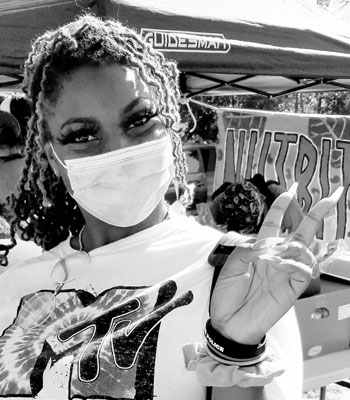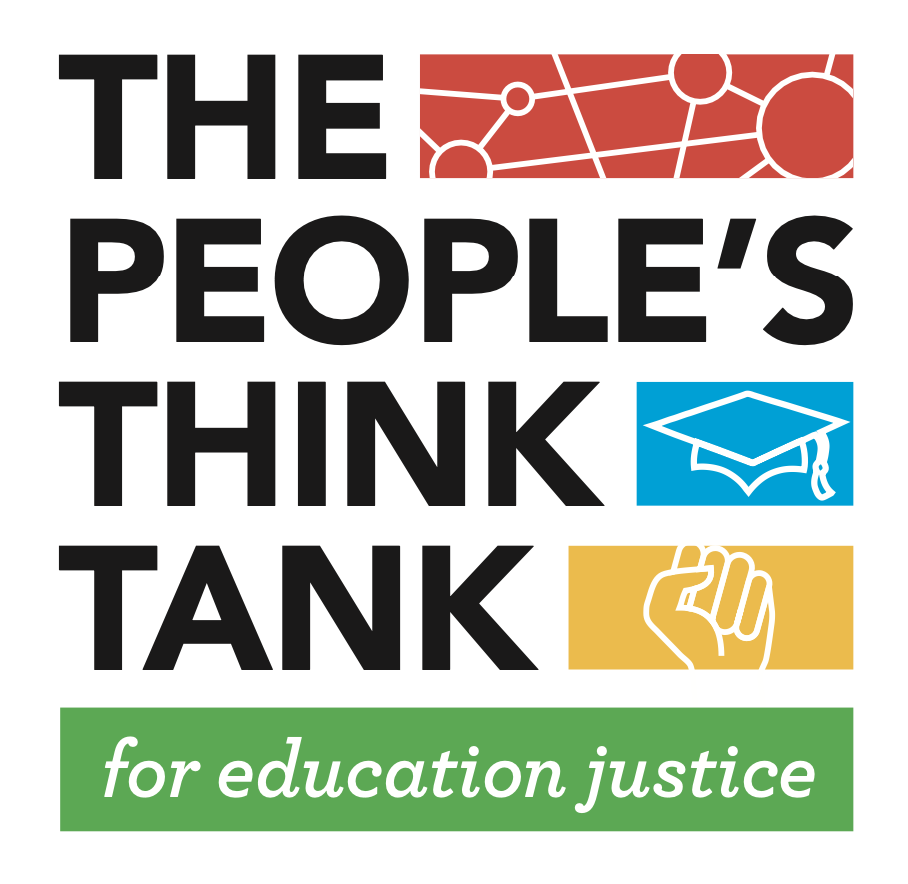< back to The Newest Abolitionists

By Lil Tree
#CopsOutCPS and BLMchi Youth
With the assistance of Violet Acumo
University of Massachusetts Boston
Lil Tree is a youth organizer with #CopsOutCPS (Chicago Public Schools) Campaign and BLMchi (Black Lives Matter Chicago) Youth who through cheerleading at all the marches and protests for the police-free schools movement, has found her voice. During the summer, they faced some of the hardest opposition in their struggle for police-free schools through police violence and having their loved ones hurt. In spite of the challenges that confront the movement, they have found purpose, community, and are building legacy.
I feel like I’ve always been organizing because my mom is an organizer and she’s been involved with movement work for as long as I can remember. My name is Lil Tree and my mom, Big Tree, is the co-founder of Black Lives Matter Chicago. I like to say my name is a metaphor for my personal power: the trunk symbolizes my strength, my roots connect me to my ancestors which grounds my strength, and my leaves and branches are my vision of utopia in my fight for liberation. By the time I was six years old, I was giving speeches at the Capitol about how upset I was about Rahm Emmanuel* closing 50 schools.
My community is very interesting, especially around my neighborhood. When I was younger, we used to all connect and have block parties, but it has quieted down, and we do not do that as much. Over the years, a lot has happened on our block, including shootings by people we know. That’s my community. However, I feel like my personal community is my family building; my auntie owns our building and so I have my Nana living downstairs, my auntie in another apartment, my great aunt downstairs from me, and my mom lives here. So, it’s just always been family coming in and out and I really appreciate it because it gives me a good support system.
My Roots
From elementary school into high school, I’ve experienced and seen a lot of confrontations with school police. From my experience, any little thing can cause a confrontation. There was a time a student had to pay for a choir trip and was accosted by a police officer who asked if they wanted to get arrested. The threat didn’t make any sense and the situation just kept escalating so fast. There was another time when I saw a school police officer throw a 16-year-old girl down on her chest and put his body weight on top of her as she bawled her eyes out.
These interactions with school police happen on a daily basis and are completely normalized. Once during a lockdown, we stayed after school and parents had to come pick up their kids. There was nobody to be found, we were all just in the classroom quiet with a teacher. At this point, I wondered, why didn’t nobody just ask me how I feel? My mom came and got me, and we just went home. She only asked me if I was okay and we moved on. It made me feel like it was just normal, we just didn’t talk about it. I feel like there are a lot of things especially within my community, the Black community, where once something happens, then that’s normal.
I just went through so much over the summer, so much. I watched my mentor – my mom, and my cousin get beat on over the summer. My brother came into the process to come support me, snorting, nose running, and coughing because he got pepper sprayed until he jumped in a lake, like it was burning that day. And I remember just other people, people I work with, parents, getting hurt and bleeding. I remember my mom giving random people keys to her car to go to the hospital and the people just getting back out there every day. There were days we just back-to-back got into my mom’s car and kept going, even after she had just gotten hit by police and had bruises on her back, yet we were still in meetings talking about the next action.
I’ve had some great experiences with adults, and I’ve been spoiled, coming from Assata’s Daughters and American Friends Service Committee (AFSC) because these groups are for youths and are intentionally trying to be far from adultist. They make it part of their mission to uplift you. However, working with adults, especially those that I don’t already have a relationship with has been really hard. When they see youth in front of a march, they have all these expectations of youth, yet still treat us like children.
Blooming and Finding My Voice
The police-free schools movement has changed the narrative and allowed youth to be listened to and has engaged with parents on their children’s safety at school. Also, winning that 15 million* victory in addition to the constant conversation of what safety looks like and whether it is policing. Through that we’ve got things like Defund Police and all these different movements which question why we are prioritizing the police and why are they what we deem safety looks like. Is it not education that is a priority? If it is, why are they in our buildings?
Because of the movement, I’ve become a different person. I use my words more often, especially the movement language. The movement has exposed me to much more language, and to articulate what I’m feeling. This helps me with my cheerleading. I identify as Black, like Black, Black, Blackity Black to the moon and back. I am gender non-conforming and my pronouns are not anything save love and respect because I don’t like binaries and gender roles. Using your voice is powerful and that’s it.
I definitely am trying to plant my feet with Chicago organizing. I love it here.
Creating Shade for Others and Consolidating the Forest
I’m getting older, though, so, I’m phasing out of youth organizing. So right now, it’s really about shifting that power to other young folks helping them break this stuff down, so as to build ourselves up. There are privileges as I get older that other youth don’t have. You want to give space for people who are most impacted in situations, right? Just acknowledging those privileges that come with age and continuously trying to shift that power and give it to the people who aren’t getting it, which at the end of the day are younger folks.
Footnotes:
- Rahm Emanuel served as the 55th mayor of Chicago from 2011 to 2019. In 2013, he closed 50 majority Black schools in low-income neighborhoods, affecting up to 49,000 students. Until then, this was the largest number of schools closed at one time in any school district in the United States.
- In August 2020, Chicago Public Schools announced that that it would slash the police school budget from $33 million to $15 million following protests against police presence in schools.
